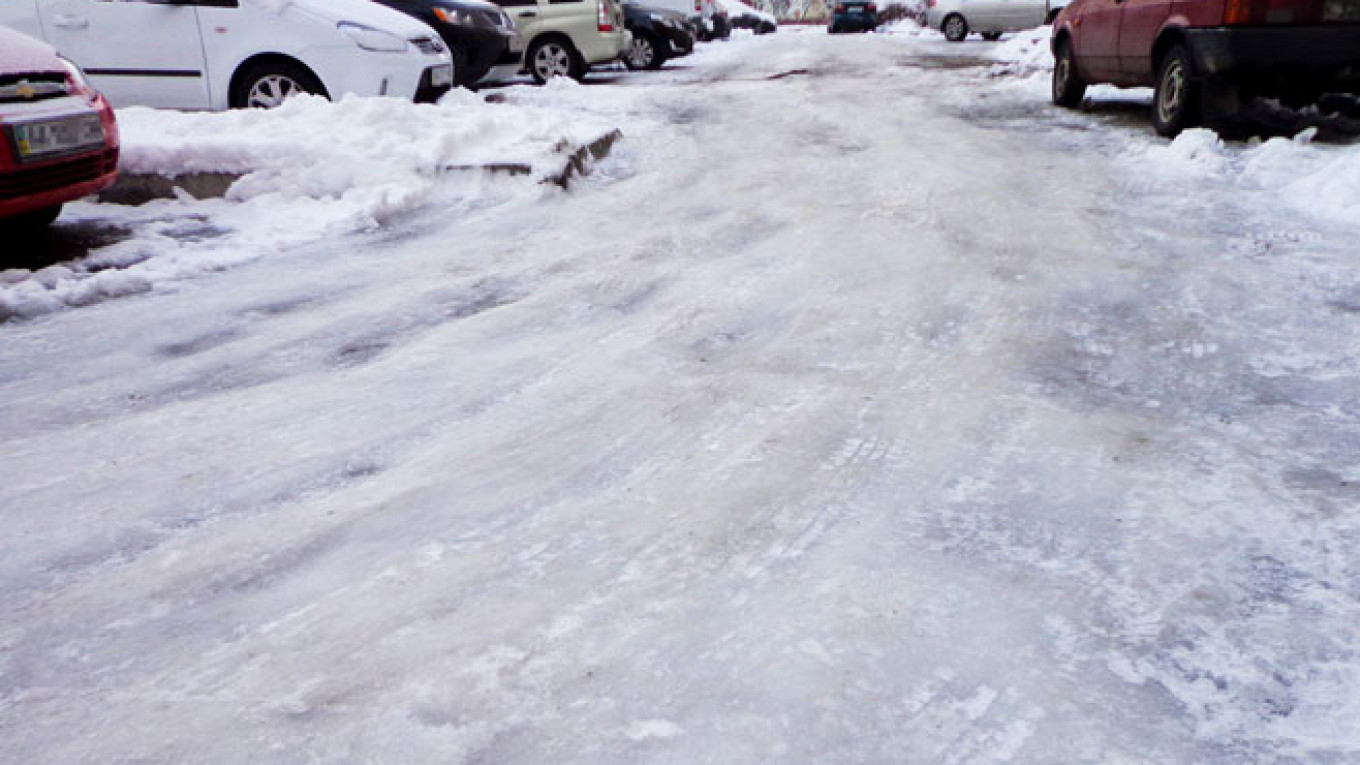
In Russian, appropriately enough, slipperiness is a slippery business.
For starters, it's hard to get a grip on how things get slippery in Russian. Let's say the weather is doing that Moscow thing — huge temperature fluctuations — and the ton of snow that was once a hard mass has turned to watery slush during the day. At night the temperature drops to just under freezing. You know what that means: a thin layer of ice on everything. But what's the right word: ?????»???»?‘?? or ?????»???»?µ?????†?°?
Not that I will ever get this right if I'm not reading it from a dictionary, but here goes: ?????»???»?‘?? is a layer of ice formed on tree branches, telephone wires, houses and windshields from drops of rain or sleet. ?“???»???»?µ?????†?° is the thin layer of ice that forms on a road or the kind of weather that produces it.
Got that? You say: ?????‚???€???¶????! ???° ?????€?????°?… ?????»???»?µ?????†?°. (Watch out! The roads are icy.) ???°???‚???????»?° ?????»???»?µ?????†?° (We've got icy weather.) But: ?“???»???»?‘?? ???° ???‹?????????????»???‚???‹?… ?»?????????… ???‚?°?» ?????·???????°?‚?? ?‡?°?‰?µ (We've had more ice on high-voltage wires lately.)
But even Russians get this wrong: ???° ?‚?€?°?????µ ?????µ?€??-?‘?µ?¶?µ?†?? ???‚?????‚ ?????€???¶???‹?? ?·???°?? "?????‚???€???¶???? — ?????»???»?‘??!" (On the highway from Tver to Bezhetsk was a sign: Be Careful! Ice condensate!) So maybe forget about learning this distinction. In 10 years the dictionaries will list the words as synonyms, so why bother?
In any case, we've got ice. ???????»???·???? (It's slippery.) So when it's slippery, you slip — ???????»???·???‚??, right?
Well, yes and no. In one context, ???????»???·???‚?? can mean to slip: ???? ???°???‚?????°?µ?‚ ???° ?»?‘??, ???????»???·???‚ ?? ???°???°?µ?‚ (He steps onto the ice, slips and falls). But in ten other contexts the slipping is really sliding and gliding and moving effortlessly across a surface, like: c?°???? ???????»???·???‚ ?? ?????€?‹ (sleds slide down the hill) or ???°?€?°?????°?? ???????»???·???‚ ???? ?±?????°???µ (the pencil glides across the paper).
So what's the prefix that makes slipping unambiguously bad? Prefixes are my personal ???»?°?±???µ ???µ???‚?? (weak spot), so I grab the dictionary.
?????????»???·?????‚??? Nope. This is slipping away, like a thief in the night: ???? ???????????»???? ?? ???€?????? ?????µ?‚?µ ?„?????°?€??, ???? ?±?‹???‚?€?? ?????????»???·?????» ?? ?‚?µ???? (He appeared in the bright light of the streetlamp but quickly slipped off into the shadows.)
With ???????????»???·?????‚?? we're getting closer. This verb can be used to describe something sliding off, like a ski or wheel or person: ?»?‹?¶?? ???????????»???·?????»?? ?? ?????? (the skis slipped off his foot); ?????»?µ???° ???????????»???·?????»?? ?? ?€?µ?»???????? (the wheels slipped off the tracks); ?????° ???????????»???·?????»?° ???? ?????°???µ?µ?‡???? (she slid off the bench). So you can use it to slip, but only if you are slippy-sliding down something: ? ?°?±???‡???? ???????????»???·?????» ?? ???????€???? ???€?‹???? (The worker slid off the wet roof.)
So what do you call it when you slip on the ice, fly up in the air and then crash down? That doesn't involve obscenities? Well, there are two possible answers from Russians: ?????????????»???·?????‚?????? and ???????????»???·?????‚??????. Dictionaries only recognize the latter, but that apparently does not reflect real speech patterns. As one person asks: ?§?‚?? ???‹ ?????°?¶???‚?µ ?? ?‚????, ?‡?‚?? ?????»???‚?€?°???‹ ???€?????·?????????‚ ?????µ?????? "?????????????»???·?????‚??????"? (What do you say about the fact that half the country says the former?)
I say: ???‚?»???‡????! (Terrific!) Another case of "wait a decade and they'll be synonyms." Meanwhile if I slip up, I'll just say: ???????»???·?????? ???·?‹??! (Slippery language.)?
Michele A. Berdy, a Moscow-based translator and interpreter, is author of "The Russian Word's Worth" (Glas), a collection of her columns.


